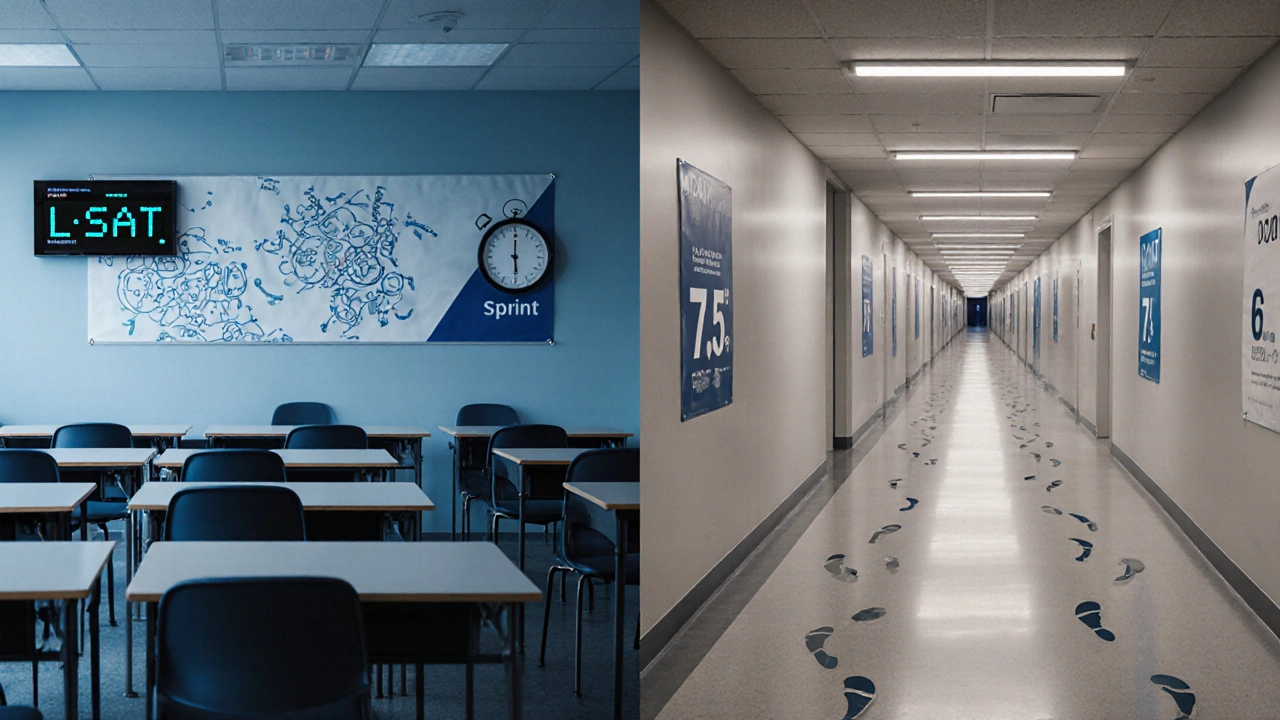
LSAT vs MCAT Decision Guide
Which Test Is Right For You?
Answer these questions to determine which exam aligns better with your strengths and goals.
Ever wonder whether the LSAT feels like a marathon or the MCAT is a sprint? Both are gate‑keepers for high‑stakes careers, but they test very different skills. Below you’ll see a side‑by‑side breakdown, real‑world preparation data, and a quick decision guide to help you figure out which test might feel tougher for you.
TL;DR - The Bottom Line
- The LSAT leans heavily on logical reasoning and reading comprehension; the MCAT adds heavy science memorization and stamina.
- If you thrive on abstract puzzles and quick argument analysis, the LSAT is usually perceived as exam difficulty lower than the MCAT.
- For candidates comfortable with biology, chemistry, and physicspluslong testing periods, the MCAT’s challenge spikes, especially in the passage‑heavy sections.
- Preparation time averages 3‑4 months for LSAT and 6‑12 months for MCAT.
- Both exams demand strategic study plans; neglecting one’s unique format will hurt your score.
What Each Test Actually Measures
LSAT (Law School Admission Test) is a standardized test used by law schools in the United States and Canada to assess applicants' readiness for legal studies. It focuses on reading comprehension, analytical reasoning, and logical reasoning, and is scored on a scale from 120 to 180. The test consists of five scored sections, each lasting 35 minutes, plus an unscored writing sample.
MCAT (Medical College Admission Test) evaluates knowledge of biological and physical sciences, as well as critical thinking and problem‑solving skills. It is divided into four sections: Biological & Biochemical Foundations, Chemical & Physical Foundations, Psychological, Social, & Biological Foundations, and Critical Analysis & Reasoning Skills. The total testing time is about 7.5 hours.
In short, LSAT=logic + reading; MCAT=science + reasoning under fatigue.
Scoring Systems and Time Pressure
Both exams use scaled scores, but the ranges and what counts as a “good” score differ greatly.
- LSAT: 120-180; top law schools look for 165+ (approximately the 90th percentile).
- MCAT: 472-528; most medical schools consider 510+ (around the 80th percentile) competitive.
The LSAT’s four timed sections create a rapid‑fire atmosphere-each question has roughly 1.2 minutes. The MCAT’s longer passages and complex problem sets give about 2-3 minutes per question, but the sheer length adds mental fatigue, especially in the CARS (Critical Analysis & Reasoning Skills) and passage‑heavy science sections.

Preparation Length, Resources, and Costs
Data from the Association of American Law Schools (2024) shows the average LSAT candidate spends 90‑120 hours on focused study, often using prep books (e.g., "The PowerScore LSAT Bible") and online question banks.
According to the AAMC (2025), MCAT aspirants clock 300‑350 study hours across six‑month to one‑year timelines, using resources like Kaplan, Princeton Review, and the official AAMC practice exams.
Cost-wise, LSAT registration is around $200, while MCAT registration sits near $320, plus 3‑5 practice tests that cost $200‑$300 each.
Difficulty From a Test‑Taker Perspective
Difficulty is subjective, but surveys reveal consistent patterns:
- Logical Reasoning vs. Science Recall: 68% of LSAT takers report the logic puzzles as the biggest hurdle, whereas 74% of MCAT takers cite dense science passages.
- Stamina: MCAT’s 7.5‑hour window forces a break‑less marathon; LSAT’s 3‑hour blocks feel more like sprints.
- Adaptability: LSAT rewards “game‑theory” tactics-identifying trap answer choices-while MCAT rewards deep content mastery and the ability to synthesize multiple disciplines.
Overall, most respondents rank the MCAT as the harder exam, mainly due to breadth of content and endurance demands.
Decision Guide: Which Test Aligns With Your Strengths?
- Assess Your Academic Background: Strong high‑school chemistry, biology, and physics? MCAT may suit you. Strong humanities, philosophy, or debate experience? LSAT likely feels easier.
- Consider Your Career Timeline: If you need to apply to law school within a year, LSAT’s shorter prep may fit better.
- Gauge Your Test‑Day Energy: If you can stay focused for 7+ hours, the MCAT’s length isn’t a deal‑breaker. If you prefer shorter bursts, LSAT’s multiple 35‑minute sections are more manageable.
- Run a Mini‑Diagnostic: Spend a day on a free LSAT logical‑reasoning set and a day on a free MCAT passage. Compare the comfort level and time taken.
These steps will help you decide which “harder” label really fits your personal profile.
Pro Tips for Tackling the Tougher Exam
- Build a Content Map: For MCAT, outline the core concepts in each science discipline; for LSAT, chart out the three question types (Logical Reasoning, Analytical Reasoning, Reading Comprehension).
- Practice Under Real Conditions: Simulate the exact timing-use a timer, no breaks for MCAT; schedule three 35‑minute LSAT blocks with short rests.
- Learn the Test’s “Tricks”: LSAT users benefit from mastering the “process of elimination” for trap answers. MCAT takers should focus on passage‑first strategies-skim, underline, then answer.
- Use Adaptive Review Tools: Platforms like Khan Academy (free MCAT) and LSAT Max (adaptive LSAT) adjust question difficulty based on your performance, maximizing efficient study time.
- Take Care of Your Body: Sleep 7‑8 hours nightly, hydrate, and schedule short physical activity breaks during long MCAT prep weeks.
Comparison Table: LSAT vs MCAT
| Aspect | LSAT | MCAT |
|---|---|---|
| Purpose | Law school admission | Medical school admission |
| Sections | 5 scored (35min each) + writing sample | 4 sections (≈90min each) total 7.5hrs |
| Primary Skills Tested | Logical reasoning, analytical reasoning, reading comprehension | Biology, chemistry, physics, psychology, critical analysis |
| Score Range | 120‑180 (average ≈150) | 472‑528 (average ≈500) |
| Typical Prep Hours | 90‑120hrs | 300‑350hrs |
| Cost (2025) | ≈$200 registration + $100‑$300 prep | ≈$320 registration + $200‑$300 prep exams |
| Perceived Difficulty (survey) | Medium | High |
Frequently Asked Questions
Is the LSAT harder than the MCAT for someone with a science background?
Generally, the MCAT remains tougher because it tests detailed scientific knowledge and endurance. Even strong science students often find LSAT’s logical‑reasoning puzzles unfamiliar, but the overall content load is lighter.
Can I take both exams in the same year?
Yes, many applicants schedule LSAT in the spring and MCAT in the summer or fall. Just ensure you have enough study bandwidth; overlapping prep can lead to burnout.
What’s the best way to gauge my natural aptitude for each test?
Take a free diagnostic from the official LSAC website and a free AAMC passage set. Compare the time you need and the comfort level you feel. Your performance will hint at which format aligns with your strengths.
How many practice tests should I complete before the real exam?
Aim for at least three full LSAT practice tests and four MCAT practice exams. Space them out over weeks to simulate test‑day conditions and review each answer thoroughly.
Do test‑taking strategies differ significantly between the two exams?
Yes. LSAT strategies focus on eliminating answer choices quickly and spotting logical fallacies. MCAT strategies revolve around passage‑first reading, note‑taking, and managing stamina across long sections.




